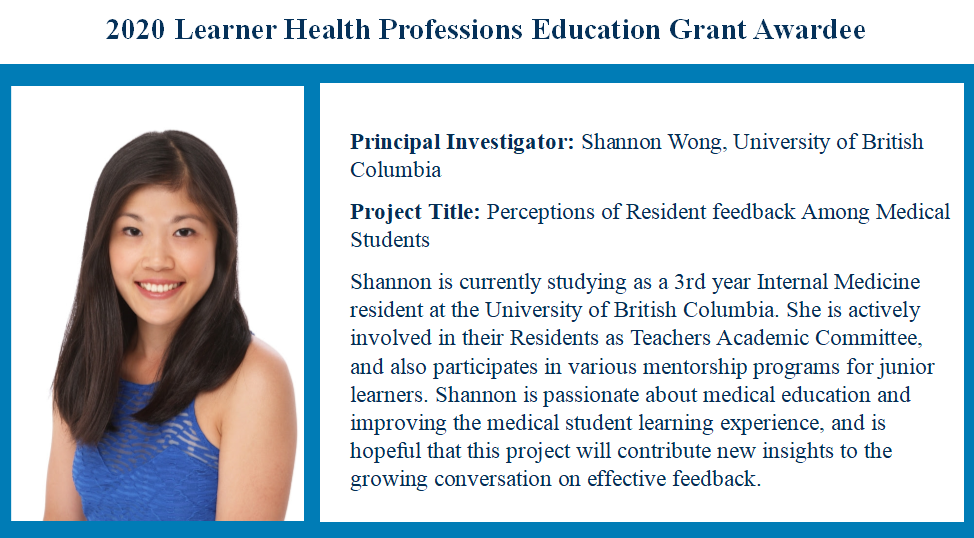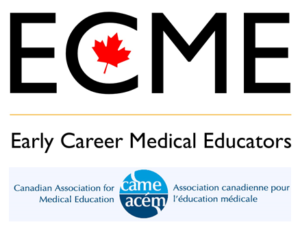Learner Health Professions Education Grant
Learners enrolled in a clinical health profession program in a Canadian university.
Award Amount: $5000.00
Our Health Professions Education Grants are now open!
The Health Professions Education Grants
Full Proposal submission deadline: January 12, 2026 at 1700 EST!
Our adjudication committees are looking forward to reading your submissions!
Successful applicants who have been selected to submit a video will be notified on February 26, 2026 via email.
Purpose
Opportunities for peer-reviewed grant support in Health Professions Education are limited. Learners and faculty at all stages, who have new projects, can face challenges in obtaining support. The CAME Foundation Health Professions Education Grants support new and innovative scholarly projects in Health Professions Education that are not part of larger, formalized and funded education research programs.
Eligibility
General criteria:
- Applicants (Principal Investigators) and Supervisors of Principal Investigators, if the Principal Investigator is a learner must be members of Canadian Association for Medical Education.
- Members of the CAME Grant Committee are not eligible to be an investigator (or author) in the project.
- Members of the CAME Executive, or the CAME Foundation Board of Directors cannot be a principal investigator on a submission; however, they can be listed as a co-investigator (or co-author).
Award amount
The maximum available funds per application are $5000, which can be spread over 12 months of support. There is a maximum of $10,000 in funds across the four grants. Funding will be awarded to one or more applicants at the discretion of the CAME Grants Committee. The committee reserves the right to not fund any projects in any given year.
Please note: The CAME Foundation grants are intended to be stand alone projects with no other funding outside of the $5000.00 and are expected to be completed within a 12 month timeframe.
For all questions related to this year’s grant process please email: CAMEFdnGrants@gmail.com
Application Process
Step 1: Full Proposal
Applicants are invited to submit a full proposal and will be requested to submit the following:
1. An abridged CV per team member (maximum 3 pages each, focusing on previous relevant experiences and training) for the principal investigator and co-investigators. Please upload it in one PDF document.
2. A project summary (maximum 1000 words) including:
• Brief literature foundation (What currently exists in the literature? What is the purpose of your study innovation?)
• Research Questions/ Objectives/ Hypothesis
• Methodology (study design, methods, participants, study duration, data analysis plan, ethics)
• Outcomes and Implications (for project participants/ local context; HPE community)
• Evaluation Plan (if applicable, such as for innovation projects)
• Knowledge mobilization plan. Note that in addition to academic activities, plans must include disseminating learnings into policy, practice, and general HPE audience. This may include public-facing outputs such as podcasts, videos, or infographics as well as institutional outputs such as policy documents and presentations to relevant interest groups.
• References (not included in 1,000-word count)
3. Budget:
CAME grants will facilitate and encourage the generation of a maximum of $5,000 through crowd-sourcing. Budgets should be designed for a $5,000 award.
• The CAME Foundation will guarantee $2,500 to each successful applicant as the starting point for crowd-sourcing
• Social media channels will be used to share your 3-minute audiovisual pitch to generate up to $5,000
• If there are excess funds, CAME will top-up the funding for project teams that did not receive donations to reach the $5,000 maximum.
• If there are no excess funds, the project team will receive the amount (minimum of $2,500) and will submit a revised budget to CAME
Ineligible expenses:
• Salary support for PI or other faculty members
• University/institution overhead
• Computers and other equipment unless integral to the study (e.g. tape recorder)
• Publication costs in an Open Access journal
• Travel expenses to attend conferences; conference registration.
• Structure your budget accordingly. Any crowd sourced funding will be then be allocated to your project and a new budget proposal can be submitted to CAME..
4. A proposed timeline.
5. A letter of support from departmental chair/chief or education dean.
6. A high definition professional photo (head shot) and 3-4 line biography.
Full proposal application details:
1. Full proposals should be submitted online via the CAME website. The online form will request the PI’s first initial, last name, short version of the title to be used as the document’s name and year (of submission).
2. Application packages should be submitted by successful applicants via the CAME website by 1700 EST on January 12, 2026.
Learner Health Professions Education Grant Full Proposal Submission Form
Step 2: 3 Minute Video Pitch – New This Year!
Successful applicants who have been selected to submit a video will be notified on February 26, 2026 via email.
Step 2: 3 Minute Video Pitch
Successful applicants will submit a three-minute audiovisual pitch outlining their project that will be uploaded to the CAME Foundation platform. A base amount of $2,500.00 will be given by the CAME Foundation and matching crowdsource funding will be sought to reach a maximum of $5,000.00.
Instructions for Submitting a Three-Minute Video for a Crowdsourcing Grant Program
To help you successfully submit your 3-minute pitch for our crowdsourcing grant program, please follow these detailed instructions:
- Prepare Your Video Content – Narrow down
- A slide will be prepared that includes your headshot, bio, list of your team, and title of your project. Please don’t introduce yourself at the start of the video and utilize the time provided to pitch your project.
- Problem/Opportunity: Clearly describe the problem you are addressing or the opportunity your project will create. Focus on real-world impacts or benefits. Why do we need this research or innovation?
- Solution/Idea: Explain how your project or idea solves the problem or seizes the opportunity. Highlight key objectives, expected outcomes, and any innovative elements.
- Impact: Describe the potential impact of your project on your community, industry, or field.
- End with a closing statement that motivates viewers to support your project.
- Video Format and Length
- Duration: Your video must not exceed three minutes. Pitches that exceed 3 minutes will be disqualified.
- File Format: Accepted formats include MP4, MOV, and AVI.
- Resolution: Minimum resolution should be 720p. Higher resolutions (1080p or above) are encouraged for clarity.
- Video Style & Guidelines
- Visuals: Ensure the video is well-lit, and the audio is clear and easy to understand. Use subtitles if necessary for accessibility.
- Tone: Be authentic, passionate, and concise to engage the audience Copyright-Free Content: Make sure all music, images, and video clips used are copyright-free or properly licensed. Where members of the public or patients are used in the video, ensure appropriate consent and approval has been given for use. .
- Be Creative – there are no limits to how you deliver your pitch as long as they meet the criteria listed above
- Uncomfortable on camera? Consider voice-over PowerPoint or the use of puppets to deliver your pitch
- Want to tap into your performance skills? Consider delivering your pitch through song and dance
Submission Process
- Upload: Upload your video. The CAME Foundation Manager will provide you with instructions on how to do so.
- Title: Name your video using this format: [Your Project Name] – [Your Name or Organization].
- Deadline: Submit your video before the March 26, 2026.
Additional Tips
- Practice: Rehearse your script or key points before recording to ensure a smooth delivery.
- Support: If possible have a colleague or team member help record the video for you. Access existing resources on video recording and editing available publicly or at your institution.
- Test: Test your video on different devices to ensure it works well across platforms.
- Review: Double-check that all information in your video is accurate and clearly conveyed.
By following these steps, you can submit a compelling video that effectively communicates your project and its potential impact. Good luck!
Crowdsourcing Additional Information
The additional funds raised during the crowdsourcing event will be allocated to the general CAME Foundation funds, providing a financial cushion for future projects. These funds will be strategically dispersed across the CAME Wooster Family Grant and Health Professions Education Grants, ensuring sustainability and growth. By pooling the raised capital into the general fund, the organization can respond flexibly to emerging opportunities, cover operational expenses, and invest in long-term projects that align with its mission. This approach allows for a more adaptable use of resources, maximizing the impact of the contributions made during the event.
Timeline for crowdsourcing is 2 months. The crowdsourcing platform will close on Friday, May 22, 2026.
CAME Foundation Learner Health Professions Education Grant Winner 2024!

Congratulations to Chloe Lee on this wonderful achievement! Stay tuned to the CAME website for more information in the months to come!
CAME Foundation Learner Health Professions Education Grant Winner 2023!

Congratulations to Lucas Streith on this wonderful achievement! Stay tuned to the CAME website for more information in the months to come!
CAME Foundation Learner Health Professions Education Grant Winner 2022!

Congratulations to Priatharsini (Tharsini) Sivananthajothy on this wonderful achievement! Stay tuned to the CAME website for more information in the months to come!
CAME Learner Health Professions Education Grant Winner 2021!
Congratulations to Chantal Phillips on this wonderful achievement! Stay tuned to the CAME website for more information in the months to come!
CAME Learner Health Professions Education Grant Winner 2020!




 ECME is pleased to announce the call for 2019 nominations for our two awards.
ECME is pleased to announce the call for 2019 nominations for our two awards.